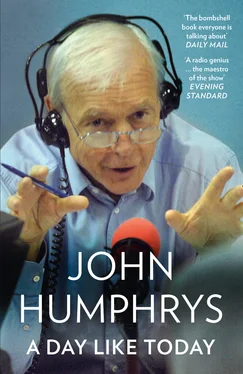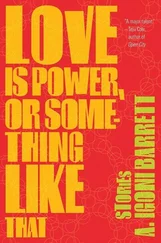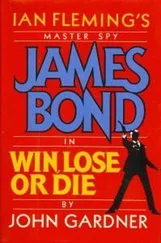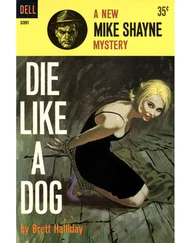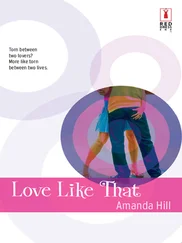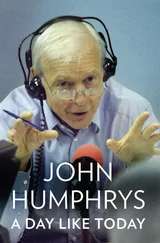‘Don’t you get bored?’ I asked him.
‘Why should I?’
‘Well, all you’re doing is laying one stone on another year after year.’
‘No, I’m not,’ he said. ‘I’m building a cathedral. What will you leave behind when you die?’
It was a fair point. Broadcasting disappears into the ether, leaving little trace behind. Those who ply the trade leave no lasting monument. My stonemason was still building his cathedral when I left. By the time it was finished, in 1978, I had become a foreign correspondent.
The wireless in our house had always been tuned to the BBC Home Service and when I was a young teenager I listened to From Our Own Correspondent with awe. I tried to imagine being one of those correspondents reporting from around the world – but only in the way that my younger self had imagined being Superman.
Those were the dark ages for television news. There was no such thing as twenty-four-hour news, no satellite feeds or electronic cameras, and no smartphones. If an earthquake or revolution struck somewhere a long way away television news editors did not, as they do today, have their pick of endless footage filmed by eyewitnesses within seconds of it happening. The first thing they reached for was an airline guide. How quickly could we get a reporter and film crew there and, once there, how quickly could we get their film back to London so that it could be processed, edited and on the next news programme? It might be a day. It might be a week – or more. My first big foreign assignment – and, as it turned out, one of my most dangerous – was in the country now called Bangladesh. In those days it was East Pakistan. It took six months to get my most dramatic footage back to London.
The partition of India in 1947 remains perhaps the darkest stain on the history of the British Empire. For centuries Muslims and Hindus had lived together on the Indian subcontinent relatively peacefully. The creation of Pakistan for the Muslim minority led to a refugee crisis of biblical proportions. Fourteen million people left their homes either to flee violence between Hindus and Muslims or to seek a new home in a new country. At least a million – some estimates are double that figure – died in the violence that broke out. It was, by any historical measure, a shameful betrayal of a great nation and its hopes.
Pakistan was created out of two regions: one in the west and one in the east. East Pakistan was carved out of Bengal, which was part of India. The Bengali people living there refused to accept their status as Pakistanis. They demanded independence. Instead, they were savagely attacked by the West Pakistan military. Vast numbers died. When I arrived there in December 1971 the country was at war with itself.
I had been in the capital Dhaka for only twenty-four hours, and was asleep in my room at the top of the Intercontinental Hotel when I was woken by what felt like an earthquake. There were thunderous explosions and the hotel seemed to sway. During the night India, which had opposed the creation of East Pakistan, had declared war on Pakistan. Indian warplanes were bombing the city.
I shot off to the airport with my camera crew to film the destruction, naively believing that the attacks had ended at dawn. They had not. We were filming the wreckage of what remained of the East Pakistan air force and the runway when the bombers with their fighter escorts returned. They had come back to finish the job and – or so it seemed to me in the terrifying hour that followed – to finish us off too. Thank God, there happened to be a fairly deep bomb crater quite close. We made a run for it.
It struck me then that all those scenes in the movies when fighters fire rockets and machine guns at targets on the ground were about as realistic as kiddies playing at cops and robbers. It’s the noise that instils the fear. Not so much the gunfire and exploding rockets, oddly enough, but the noise of jet engines screaming above your head so close it feels you could reach up and touch them. I have never heard anything like it and nor do I ever want to hear anything like it ever again. I was terrified.
But we made it to the crater, jumped in and my cameraman started yelling at me: ‘Piece to camera! Do a fucking piece to camera!’
Was he mad? We were about to die. Why would I want to do a piece to camera, and anyway what was there to say? But he wasn’t mad – just much more experienced and battle-hardened than me. So I did. To this day I have no idea what I said – or, rather, screamed.
I learned a few things about myself and my trade as a result of that little episode. The first is that it is never wise to assume the bombers will not return to finish the job. The second is that it’s not a bad idea if you’re entering a battlefield to wear something a bit more protective than sun cream. And the third is that reporters have a different set of priorities from real people.
I imagine that the first thought most sane and rational human beings would have had would be something like: ‘Thank God I survived!’ My first thought was: ‘Wow, we must have some bloody brilliant pictures!’ My second thought, which became my first thought, was: ‘And we were the only film crew there! This city is packed with foreign correspondents and film crews and we are the only one with pictures of the Indian air force attacking the airport!’
Pathetic? Yes, with the benefit of half a century in this trade I suppose it is. But it’s not enough to know you have good pictures. What matters is that they must be better than anyone else’s. And that explains what happened next.
I was back in my hotel room wondering how the hell we were going to get our film to London when Michael ‘Nick’ Nicholson knocked on my door. Nick was the opposition. He was the ITN reporter and the best in the business. Hugely experienced, clever, brave, resourceful, brilliant on camera and probably the most competitive human being I have ever worked with – which is saying something.
He was so far my superior in every aspect of our craft that I was mildly surprised he had deigned to pay me a visit – he’d ignored me until then – and even more surprised when he told me he wanted to help. He’d heard that we’d shot some decent stuff at the airport and said he had a small charter plane which was taking his own footage out of Dhaka to Burma where his agent would put it on a plane to London. Did I want my film to go too? You bet I did! The answer to my prayers. He might be the most ruthless operator in the business, but what a decent human being Nick was when his colleagues needed a bit of help. I told him I’d get the film from my cameraman, who was having a much-deserved snooze, when he woke up in an hour or so.
‘No good,’ said Nick, ‘the plane is waiting to take off. I need it now.’
And then the little worm of doubt did its job. I told him my cameraman would be extremely cross to be disturbed and then I went down to the hotel lobby. The first journalist I saw was a friendly stills photographer: ‘Ah, John, heard about the plane have you? It’s been set up by the Americans … probably leaving in a couple of hours. We’re all using it.’
To his credit Nick managed to look a little sheepish when I told him I wouldn’t be handing my precious film to him after all. Later that afternoon the plane took off headed for Burma with all our footage including my own. I treated myself to a large whisky and settled back to await the congratulatory Telex messages from my bosses in London. They never came – for the very good reason that the film took longer to get to London than if it had travelled by camel.
The country I had flown out to on 1 December 1971 was East Pakistan. When I flew home three weeks later East Pakistan no longer existed. The war lasted only thirteen days, one of the shortest wars in history, and Pakistan signed the instrument of surrender on 16 December. The new country of Bangladesh was born. The Bengali people, who had suffered terribly under what they regarded as the Pakistani occupation, went wild. It was the first (and last) time I had ever been carried shoulder-high through the streets of a city by a massive, cheering mob who regarded the BBC as heroes. Tragically, the Pakistan military had taken a different view. When we arrived in Dhaka we had recruited a local Bengali to work with us as guide and interpreter. One night he disappeared. We found him the next day in a ditch with his stomach slit open. Would he have been a target had he not been working for the BBC? It is impossible to know, but equally impossible not to feel guilt.
Читать дальше
